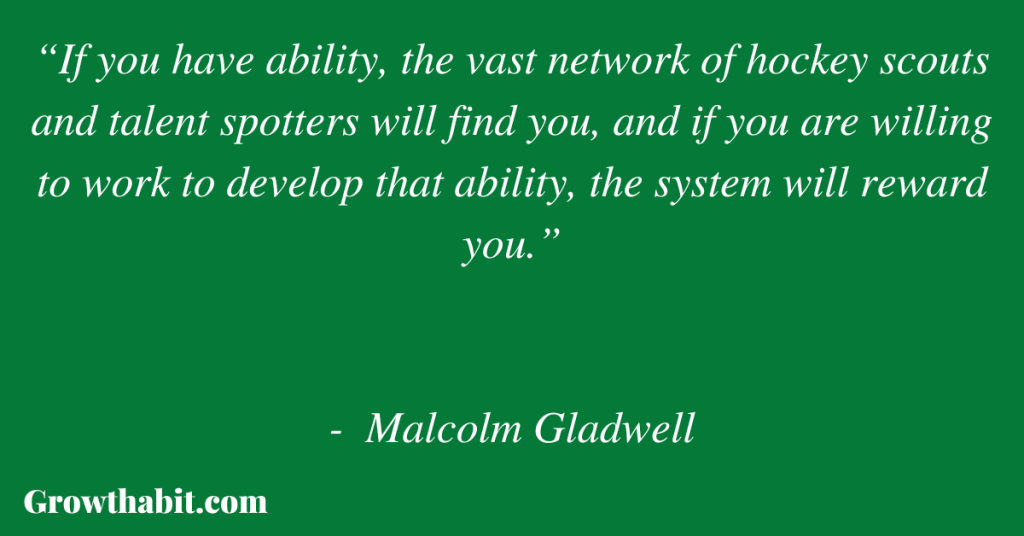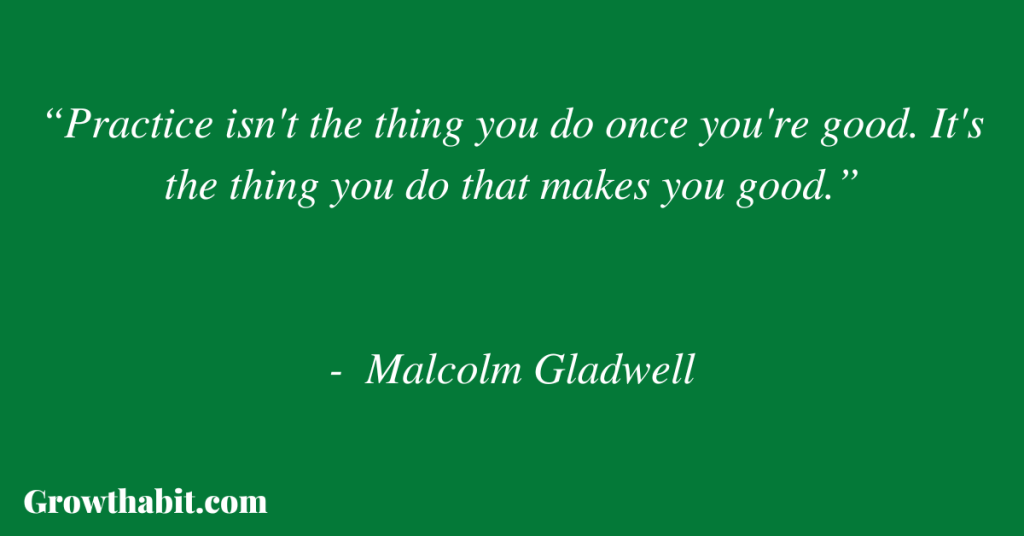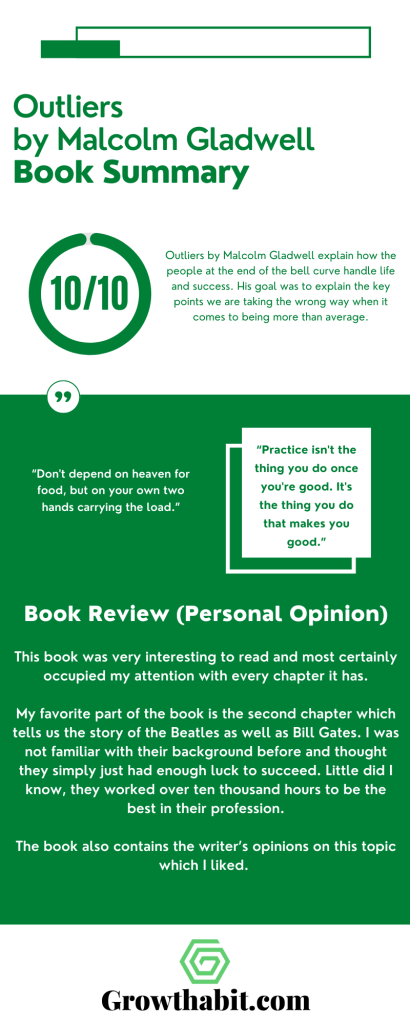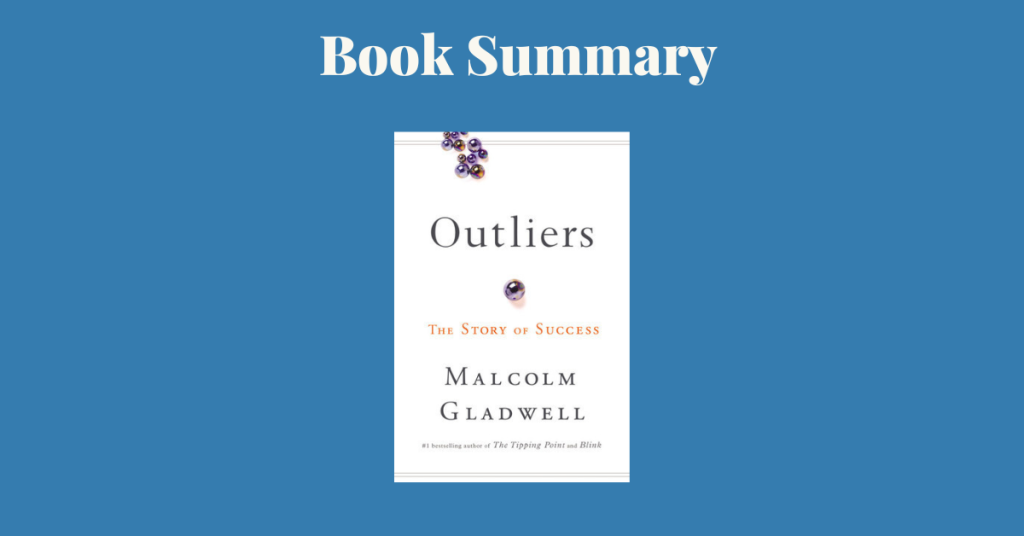Outliers by Malcolm Gladwell explain how the people at the end of the bell curve handle life and success. His goal was to explain the key points we are taking the wrong way when it comes to being more than average.
Book Title: Outliers, The Story of Success
Author: Malcolm Gladwell
Date of Reading: Feb 2023
Rating: 10/10
What Is Being Said In Detail
This book discusses how success works for people who are outliers. We always wonder what it takes to be remembered and this book gives you answers to it.
Each chapter gives you a valuable lesson at the end from which you learn.
It focuses on psychological but also physical aspects of people’s intelligence. You can find a few pieces of research that have been described in order to figure something out from it.
INTRODUCTION: The Roseto Mystery
Introduction talks about a place in Italy. It describes the town of Roseto Valfortore before and during the nineteenth century. A group of people sailed to America for work.
Soon, more and more people from Roseto arrived. In the end, they called the place Roseto since most of them came from that village. The place was a mystery to others, but not to a man called Stewart Wolf. He decided to explore the world of Italians in his surroundings.
CHAPTER ONE
Throughout Chapter 1, we are taken back to 2007 when the Memorial Cup hockey championships happened in Vancouver where the Tigers and the Giants met. It also explains how one can climb the steps to success in hockey.
There is a pattern of how to get to the hall of fame described in every other field like it is in this sport. Here, the writer explains how psychologist Roger Barnsley compares the birth dates of hockey players with their success in the sport. The kids that develop first, end up taking being the most successful.
CHAPTER TWO
Chapter 2 introduces us to Bill Joy, a man who engraved himself in the history of modern computing. The content goes on with the research of how many hours of practicing you need to master a skill.
The era of Joy Bill’s adulthood was when computers were so much different than now, the access to them was tricky. However, as the writer explains, the following circumstances went in his favor.
The chapter also reflects on two different ends of success: The Beatles and their journey to the top, as well as Bill Gates’ young age when he started programming.
CHAPTER THREE
Chapter 3 is about the research of Lewis Terman on intelligent students and how some of his patterns are still used nowadays in schools and also in companies for job interviews.
He points out the error he made throughout the process. Answers to a question about how important IQ is in your overall success.
CHAPTER FOUR
Chapter 4 goes through Christopher Langan’s life and situations that weren’t much helpful in becoming an academically educated person. He compares it to Robert Oppenheimer’s list of events.
Further on, we see how much of an impact in your overall intelligence family has. The technique of raising children between rich and poor families is slightly different, and it’s shown in Langan’s and Oppenheimer’s lives.
CHAPTER FIVE
In chapter 5, we are introduced to Joe Flom whose life story is a bit contradictory to what was said in the previous chapters.
It lists a few happenings that are lawyer related so we can picture more clearly how Flom got to where he did. How much did the factors like demographic luck, being Jewish, and new to America influenced their lives?
CHAPTER SIX
Chapter 6 focuses on the culture of honor, starting with a feud between two families, Howard and Turner.
In the early 1990s, two psychologists at the University of Michigan decided to experiment on this topic because they were aware of the pattern in this area. Their results tell us how much of an impact on your mentality your roots have.
CHAPTER SEVEN
Chapter 7 helps to understand how the Korean Air company transformed itself from the worst kind of outlier into one of the best by analyzing and comparing some of the landings and what their pilots did.
It explains what typical accidents involve and how the errors that cause a plane to crash are invariably errors of teamwork and communication. Gladwell offers insight into what should have been done or how some problems should have been communicated in the situations.
CHAPTER EIGHT
The first part of chapter 8 talks about rice paddies in Southern China. The second part takes math and linguistics, comparing math arithmetic operations, remembering a sequence of numbers with other languages and their words for numbers.
Then it analyzes the difference between Asian and American children and their math skills. It also compares western and eastern farmers and their farm methods (potatoes and rice). It shows how geographical location and language play a massive part in building a culture.
CHAPTER NINE
Chapter 9 analyzes the educational system, analyzing the difference between poorer and wealthier kids during the summer vacation and compares test results at the end and start of the school year.
It compares the number of school days with other countries, where the school year in the United States is, on average, 180 days long while other countries have longer school days.
Most Important Keywords, Sentences, Quotes
INTRODUCTION: The Roseto Mystery
“The townsfolk were barely literate and desperately poor and without much hope for economic betterment until word reached Roseto at the end of the nineteenth century of the land of opportunity across the ocean.”
“[…]since Roseto was so much in its own world that it was possible to live in the next town and never know much about it.”
“There was no suicide, no alcoholism, no drug addiction, and very little crime. They didn’t have anyone on welfare. Then we looked at peptic ulcers. They didn’t have any of those either. These people were dying of old age. That’s it.”
“The Rosetans were healthy because of where they were /grew, because of the world they had created for themselves in their tiny little town in the hills.”
“They had to appreciate the idea that the values of the world we inhabit and the people we surround ourselves with have a profound effect on who we are.”
CHAPTER ONE
“If you have ability, the vast network of hockey scouts and talent spotters will find you, and if you are willing to work to develop that ability, the system will reward you.”
“This is a book about outliers, about men and women who do things that are out of the ordinary.”
“We’re going to uncover the secrets of a remarkable lawyer, look at what separates the very best pilots from pilots who have crashed planes, and try to figure out why Asians are so good at math.”
“In Outliers, I want to convince you that these kinds of personal explanations of success don’t work. People don’t rise from nothing. We do owe something to parentage and patronage.”
“But in fact they are invariably the beneficiaries of hidden advantages and extraordinary opportunities and cultural legacies that allow them to learn and work hard and make sense of the world in ways others cannot.”
“[…] the tallest oak in the forest is the tallest not just because it grew from the hardiest acorn; it is the tallest also because no other trees blocked its sunlight, the soil around it was deep and rich, no rabbit chewed through its bark as a sapling, and no lumberjack cut it down before it matured.”

“If you make a decision about who is good and who is not good at an early age; if you separate the “talented” from the “untalented”; and if you provide the “talented” with a superior experience, then you’re going to end up giving a huge advantage to that small group of people born closest to the cutoff date.”
“The small initial advantage that the child born in the early part of the year has over the child born at the end of the year persists. It locks children into patterns of achievement and underachievement, encouragement and discouragement, that stretch on and on for years.”
“For unto everyone that hath shall be given, and he shall have abundance. But from him that hath not shall be taken away even that which he hath.”
CHAPTER TWO
“If you put your Mac in that funny mode where you can see the code,” Joy says, “I see things that I remember typing in twenty-five years ago.”
“Here was a world that was the purest of meritocracies. Computer programming didn’t operate as an old-boy network, where you got ahead because of money or connections.
It was a wide-open field in which all participants were judged solely on their talent and their accomplishments.”
“And what’s more, the people at the very top don’t work just harder or even much harder than everyone else. They work much, much harder.”
“Ten thousand hours is the magic number of greatness”
“Practice isn’t the thing you do once you’re good. It’s the thing you do that makes you good.”
“But before he could become an expert, someone had to give him the opportunity to learn how to be an expert.”
“And what was so special about Hamburg wasn’t that it paid well. It didn’t. Or that the acoustics were fantastic. They weren’t. Or that the audiences were savvy and appreciative. They were anything but. It was the sheer amount of time the band was forced to play.”
“But what truly distinguishes their histories is not their extraordinary talent but their extraordinary opportunities”
CHAPTER THREE
“Being discontented with what he considered the inadequate treatment of land travel in a class unit on ‘Transportation,’ he agreed that time was too limited to do justice to everything.”
“There is nothing about an individual as important as his IQ, except possibly his morals …”
“In general, the higher your score, the more education you’ll get, the more money you’re likely to make, and believe it or not the longer you’ll live.”
“But given what we are learning about intelligence, the idea that schools can be ranked, like runners in a race, makes no sense”
“Knowledge of a law student’s test scores is of little help if you are faced with a classroom of clever law students.”
“If intelligence matters only up to a point, then past that point, other things thing that have nothing to do with intelligence must start to matter more. “
CHAPTER FOUR
“[…] so I’m afraid that you don’t have a scholarship here anymore. That was the style of the place. They simply didn’t care. They didn’t give a shit about their students. There was no counseling, no mentoring, nothing.”
“Here he was, a man with an insatiable appetite for learning, forced for most of his adult life to live in intellectual isolation.”

“There they are, the professor and the prodigy, and what the prodigy clearly wants is to be engaged, at long last, with a mind that loves mathematics as much as he does.”
“You can have lots of analytical intelligence and very little practical intelligence, or lots of practical intelligence and not much analytical intelligence, or as in the lucky case of someone like Robert Oppenheimer you can have lots of both.”
“If you are someone whose father has made his way up in the business world, then you’ve seen, firsthand, what it means to negotiate your way out of a tight spot.”
“The plain truth of the Terman study, however, is that in the end almost none of the genius children from the lowest social and economic class ended up making a name for themselves.”
“I found if I go to bed with a question on my mind, all I have to do is concentrate on the question before I go to sleep and I virtually always have the answer in the morning. Sometimes I realize what the answer is because I dreamt the answer and I can remember it.”
CHAPTER FIVE
“For a period of almost thirty years, if you were a Fortune 500 company about to be taken over or trying to take over someone else, or merely a big shot in some kind of fix, Joseph Flom has been your attorney and Skadden, Arps has been your law firm and if they weren’t, you probably wished they were.”
“Successful people don’t do it alone. Where they come from matters. They’re products of particular places and environments.”
“If you were not of the right background and religion and social class and you came out of law school in that era, you joined some smaller, second-rate, upstart law firm on a rung below the big names downtown, or you simply went into business for yourself and took “whatever came in the door”that is, whatever legal work the big downtown firms did not want for themselves.”
„But in the judgment of colleagues and of some adversaries, his will to win was unsurpassed and he was often masterful.”
Being jewish, demographic luck, the garment industry and meaningful work.”
“The sense of possibility so necessary for success comes not just from inside us or from our parents. It comes from our time: from the particular opportunities that our particular place in history presents us with.”
”[…] but the fact that in America even poor people could save all the dreary, time-consuming labor of making their own clothes simply by going into a store and walking out with what they needed. There was a field to go into, a field to thrill to.”
“There is no doubt that those Jewish immigrants arrived at the perfect time, with the perfect skills,” says the sociologist Stephen Steinberg. “To exploit that opportunity, you had to have certain virtues, and those immigrants worked hard. They sacrificed.
They scrimped and saved and invested wisely. But still, you have to remember that the garment industry in those years was growing by leaps and bounds. The economy was desperate for the skills that they possessed.”
CHAPTER SIX
“When one family fights with another, it’s a feud. When lots of families fight with one another in identical little towns up and down the same mountain range, it’s ^pattern.”
“So he has to be aggressive: he has to make it clear, through his words and deeds, that he is not weak.
He has to be willing to fight in response to even the slightest challenge to his reputation and that’s what a “culture of honor” means. It’s a world where a man’s reputation is at the center of his livelihood and self-worth.”
“Only in a culture of honor would it have occurred to the irascible gentleman that shooting someone was an appropriate response to a personal insult. And only in a culture of honor would it have occurred to a jury that murder under those circumstances was not a crime.”
CHAPTER SEVEN
“The whole flight-deck design is intended to be operated by two people, and that operation works best when you have one person checking the other, or both people willing to participate …“
“To put that record in perspective, the “loss” rate for an airline like the American carrier United Airlines in the period 1988 to 1998 was .27 per million departures, which means that they lost a plane in an accident aboutonce in every four million flights.
The loss rate for Korean Air, in the same period, was 4.79 per million departures more than seventeen times higher.”

“By the time of the Shanghai crash, the Korean president, Kim Dae-jung, felt compelled to speak up. “The issue of Korean Air is not a matter of an individual company but a matter of the whole country,” he said. “Our country’s credibility is at stake.” Dae-jung then switched the presidential plane from Korean Air to its newer rival, Asiana.“
“The kinds of errors that cause plane crashes are invariably errors of teamwork and communication.”
CHAPTER EIGHT
“Rice was what you sold at the market to buy the other necessities of life. It was how wealth and status were measured. It dictated almost every working moment of every day. “Rice is life,” says the anthropologist Gonealo Santos, who has studied a traditional South Chinese village. “
“Without rice, you don’t survive. If you want to be anyone in this part of China, you would have to have rice. It made the world go around.”
“There is an expectation that I can do this. There is an expectation that it’s sensible. For fractions, we say three-fifths. The Chinese is literally ‘out of five parts, take three.’ That’s telling you conceptually what a fraction is. It’s differentiating the denominator and the numerator.”
As the anthropologist Francesca Bray puts it, rice agriculture is “skill oriented”: if you’re willing to weed a bit more diligently, and become more adept at fertilizing, and spend a bit more time monitoring water levels, and do a better job keeping the claypan absolutely level, and make use of every square inch of your rice paddy, you’ll harvest a bigger crop.”
“If God does not bring it, the earth will not give it” is a typical Russian proverb. That’s the kind of fatalism and pessimism typical of a repressive feudal system, where peasants have no reason to believe in the efficacy of their own work.”
”Don’t depend on heaven for food, but on your own two hands carrying the load.“
“Working really hard is what successful people do, and the genius of the culture formed in the rice paddies is that hard work gave those in the fields a way to find meaning in the midst of great uncertainty and poverty.”
“We sometimes think of being good at mathematics as an innate ability. You either have “it” or you don’t. But to Schoenfeld, it’s not so much ability as attitude. You will master mathematics if you are willing to try.”
CHAPTER NINE
“KIPP is, rather, an organization that has succeeded by taking the idea of cultural legacies seriously.”
“Education lays the foundation of a large portion of the causes of mental disorder,” Jarvis wrote.
Similarly, the pioneer of public education in Massachusetts, Horace Mann, believed that working students too hard would create a “most pernicious influence upon character and habits. Not infrequently is health itself destroyed by over-stimulating the mind.”
“Everything we have learned in Outliers says that success follows a predictable course. It is not the brightest who succeed. If it were, Chris Langan would be up there with Einstein. Nor is success simply the sum of the decisions and efforts we make on our own behalf. It is, rather, a gift. “
“Outliers are those who have been given opportunities and who have had the strength and presence of mind to seize them.”
Book Review (Personal Opinion):
This book was very interesting to read and most certainly occupied my attention with every chapter it has.
My favorite part of the book is the second chapter which tells us the story of the Beatles as well as Bill Gates. I was not familiar with their background before and thought they simply just had enough luck to succeed. Little did I know, they worked over ten thousand hours to be the best in their profession.
The book also contains the writer’s opinions on this topic which I liked.
Rating: 10/10
This Book Is For:
- Students
- Professors of psychology
- Historians
If You Want To Learn More
Check out what influential speakers had to say about this book on Microsoft Research:
Outliers: Why Some People Succeed and Some Don’t
How I’ve Implemented The Ideas From The Book
The book gives a bigger picture on overall success factors.
What I have learned while reading is that we are getting it a bit wrong. We don’t have to be the brightest or have an enormous IQ score to be successful. In fact, many such people end up with an average life.
Lastly, if we don’t work for what we want to achieve, it won’t happen, No matter how much we think we are capable of doing stuff, until we do them it does not count.
One Small Actionable Step You Can Do
Hall of fame can be a frightening space if you don’t know what you are doing. Each chapter of this book is related to common mistakes we all make when it comes to success.
Chapter 2 caught my attention the most because it directly tells us how many hours we have to spend doing something to be the best in our field. An inspiring example about The Beatles will surely motivate everyone towards better.

